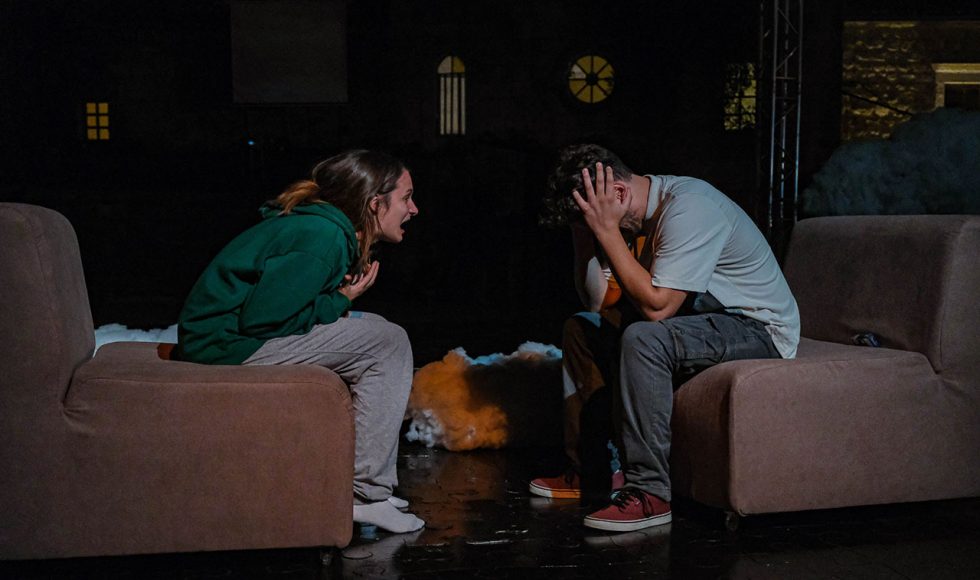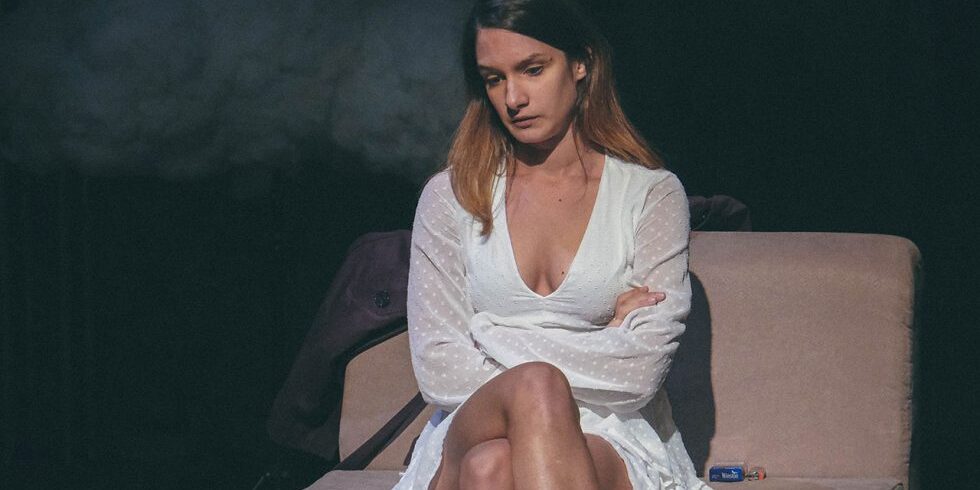Academic Theatre – Change, Beoart /Serbian National Theatre, premiere 27th October 2023
Tomorrow I will get up and chase the same things again.
Can’t Escape Sundays by Tena Štivičić is a story about the beginning, end, and continuation of a romantic relationship, with characters spanning from Gen Z and Millennials to Gen X.Štivičić is one of the best European playwrights working today, known for her incredible sharpness in dialogue. She manages to identify the common denominator of human relationships and presents it in a way that avoids clichés, steering clear of turning the commonplace into a mere comedic gimmick. Can’t Escape Sundays is a character comedy and her first play, written during her third year of Dramaturgy at the Zagreb Academy of Dramatic Arts, and remains one of her most performed works to this day.
She, an anxious bouncing ball full of worries, carrying weltschmerz on her fragile shoulders, afflicted by the need for control, orthorexia, and unhealthy empathy, meets Him. He exudes a laid-back demeanour, a touch of lethargy, navigating life day by day with moderate optimism, confidently trusting in his ability to handle whatever comes his way. Unencumbered by worldly worries, he finds contentment in the simplicity of average life experiences. When She, an electrified particle with no clear trajectory, collides with Him, the rolling mass travelling on inertia, love happens. She will, of course, later overthink that love. From that moment, a whirlwind of everyday situations begins, starting exciting, filled with magical moments, and ending up in loneliness and cynicism. Beyond the charming scenes where couples can recognize themselves, Štivičić, in her text, raises questions about relevant modern problems — what to do with all the concern we have in the micro and macro cosmos and whether constant verbalization and drowning in that worry will make us feel better.
Talented young director Tamara Kostrešević approaches directing in a way that serves the text. She emphasizes parts of the play by changing the rhythm and incorporating choreographic miniatures. Miscommunications that often arise from gender roles in the play are not stereotypically portrayed, but are instead based directly on the characters. Her intimate directorial approach works exceptionally well during their monologues, providing insights into the female and male psyche.

Can’t Escape Sundays. Serbian National Theatre
The actors Anđela Pećinar and Aljoša Đidić ground their characters in realism and actor-partner trust. With great ease, they draw us into the oppressive yet comical dynamics of their characters’ relationship. Anđela managed to avoid falling into a state of hysteria, refraining from exaggerating or imitating the internal struggles typical of the female gender. She offers a broad range and diversity in portraying a constant state of tension and cognitive anxiety. Aljoša presents a phlegmatic character without forced psychological dissection. He manages to breathe life into a character who, despite often being bored, does not bore the audience. Both actors have a great talent for comedy.
The set design by Katarina Cimbaljević incorporates two armchairs that engage in playful interactions in various ways. They primarily mark the space of the apartment, but the armchairs also transform into a bar or abstractly serve as a shield from a partner’s attacks, a guard against confrontation, and a tower of the comfort zone. The puzzle floor initially seems like a metaphor for the complexity of a romantic relationship, a pile of problems related to seduction, love, and betrayal that build upon each other. Later they transform into tangible puzzles that she organizes as a meditative practice to alleviate her anxiety. Clouds arranged around She and He associatively transport us to paradise. Their relationship initially seems very harmonious and fairy-tale-like, as if they are a match made in heaven. However, as She says in one moment, you work hard all week to be rewarded with a Sunday break when you are supposed to relax and rest. But the Sunday always turns out to be depressing. Similarly, you live your whole life hoping to be allowed into paradise, and when you finally get there, it turns into a Sunday. Both the idea of Paradise and Sunday, in which the characters are metaphorically ensnared, despite their outward appearance of peace and serenity, turn into a noose around their necks.
The compositions (Filip Gotovac) injected emotional intensity into the scenes. I’d like to spotlight the seasoned duo of sound and lighting designers – Filip Gotovac and Branislav Milinković. These roles are frequently overlooked in dramatic theatre, but I want to emphasize them because the atmosphere they made, played a crucial role in creating the incredibly convincing atmosphere essential for this performance
Can’t Escape Sundays is an unpretentious play that doesn’t mock but, through humour, heals romantic relationships, and anxious individuals, and celebrates love. In our theatres, there is rarely a sense of community, an awakening of the collective unconscious in the audience. This performance, however, achieves this. And I can’t thank the authors enough.
Credits:
Director: Tamara Kostrešević // Set and costumes: Katarina Cimbaljević // Music and sound design: Filip Gotovac // Lighting design: Branislav Milinković // Producer: Mladenka Ostojić
Performers: Anđela Pećinar, Aljoša Đidić
Further reading: review of 64 by Tena Štivičić
Divna Stojanov is a dramaturg and playwright. She writes mainly for children and young people.








